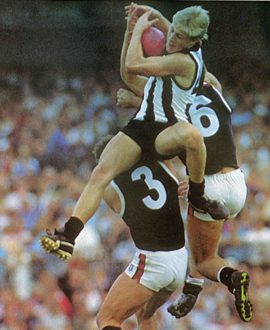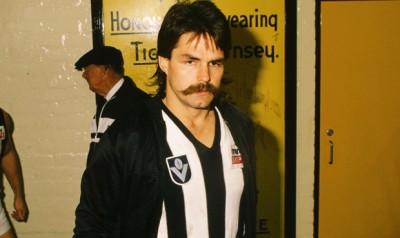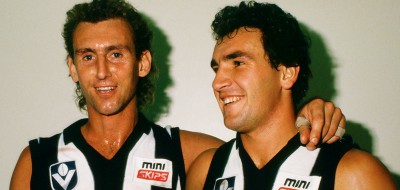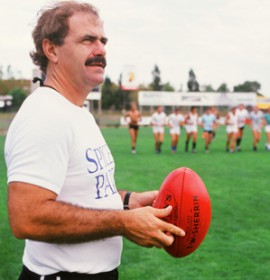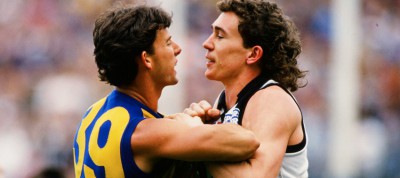It was the sort of debut that left Collingwood fans salivating with excitement for what might come next.
Nineteen-year-old Heath Shephard, the son of 46-game Magpie Graeme and father-son selection from the 1988 National Draft, turned an otherwise routine rout against the Brisbane Bears at Victoria Park into a standout debut performance that few Collingwood first-gamers could ever hope to emulate.
It was round three, 1989, and Shephard had been elevated into the senior team after kicking nine goals in his two reserves games after some good practice match form earlier.
By game’s end, the blond forward from Burnie in Tasmania, via Mackay in Queensland and Robinvale in country Victoria, had kicked 5.5 from his 18 possessions, dragged down a couple of spectacular marks, secured a Brownlow Medal vote, and managed with his family to keep the Collingwood Social Club open well beyond its normal operating hours that night.
It was Boys’ Own Annual stuff. A long career in Black and White seemed if not assured, then the most likely option.
But almost within the blink of an eye – at least in football terms – Shephard’s AFL career was over. Like a comet that flashed brightly but all-too-briefly, he played only a further 10 games for the Magpies – for eight more goals across two seasons – before re-emerging as a Brisbane player for four more games and one more goal in 1992.
By his own admission, Shephard was unable to turn his undoubted natural talent and freakish skill set into the consistency of performance that league football demands.
“I suppose you could say I was a bit of a party boy back then,” he admitted. “Looking back, I reckon I set a target to play in the VFL because Dad did, and once I achieved that, I was happy.”
However brief his time was in black and white, Shephard’s first match sits forever in the minds of those who were there, especially for his first quarter of football. In the space of half an hour, as the Sun News-Pictorial documented, he “took two memorable marks, kicked two goals, two behinds, put two shots out on the full, and had the crowd murmuring expectantly every time the ball went into the Collingwood forward line.”
Shephard was a natural forward, with loads of flair. He could kick equally well with either foot, could pluck a big mark and seemed to know where the ball was heading before most others had even got a sniff of it. He was good at ground level too, a great opportunist but also capable of winning his own ball in the contest.
All of those talents - and more - were on display in his debut. One of Heath’s big grabs that day made it into the sports sections of the newspapers of the time, though nothing could quite beat the live action of his snap on his opposite foot from a near-impossible angle in front of the Collingwood Social Club.
“The snap from the boundary was something else,” Shephard said later. “I knew I could do it because I can kick both feet. Even though I am a natural right-footer, I’d back myself more on my left when I’m kicking for goal.”
Coach Leigh Matthews tried to keep Shephard’s performance in perspective, though he was feted from the moment he left the field. Fan mail flooded into Victoria Park for him from early the next week.
“You can’t afford to keep dwelling on those moments,” he said at the time. “Afterwards everyone comes up to you and congratulates you and calms you down. They (the club) let me have the glory for a few days and float on cloud nine after my first game and then they dragged me back to where I belong.”
But football can be a great leveller, as Shephard found out within weeks. He kicked two goals in his second game, then a single goal in his third. By his fourth, he was banished to the bench without a goal. He kicked three goals against Carlton in round eight, and three more against West Coast in the last game of the home-and-away season, but tellingly he was overlooked for the finals.
Only two more games followed for him in 1990, and he was delisted by the club in the afterglow of the premiership success. After a year with Burnie Hawks in Tasmania, Shephard was granted one last AFL chance with Brisbane. But he was only afforded four games for the Bears in 1992, his league career ending in frustration at the lack of opportunities granted to him with the struggling club.
Matthews said Shephard’s highlights reel, however brief, had few “mundane moments”. One-time teammate Brian Taylorsaid he was “very flamboyant with great skills, and should have played a lot of football. But like a lot of young players who start off well, I think Heath thought it was all going to happen for him.”
His AFL career was over. But Shephard played on in lower leagues, including with West Preston in the Diamond Valley Football League, providing plenty more highlights for the crowds at grass-roots level, as he did for such a fleeting time at Collingwood.


